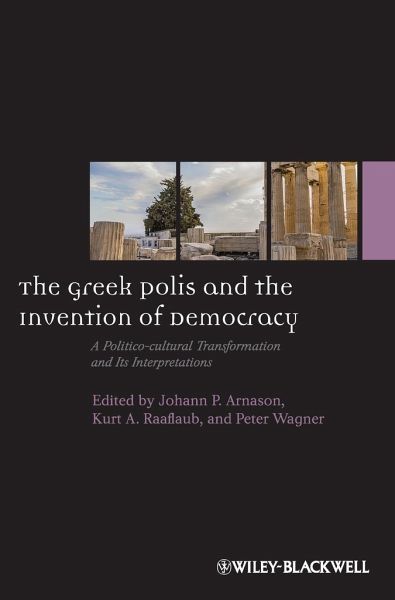
The Greek Polis and the Invention of Democracy
A Politico-Cultural Transformation and Its Interpretations
Herausgegeben von Arnason, Johann P.; Raaflaub, Kurt A.; Wagner, Peter
Versandkostenfrei!
Versandfertig in über 4 Wochen
157,99 €
inkl. MwSt.
Weitere Ausgaben:

PAYBACK Punkte
79 °P sammeln!
The Greek Polis and the Invention of Democracy presents aseries of essays that trace the Greeks' path to democracy andexamine the connection between the Greek polis as a citizenstate and democracy as well as the interaction between democracyand various forms of cultural expression from a comparativehistorical perspective and with special attention to the place ofGreek democracy in political thought and debates about democracythroughout the centuries.Presents an original combination of a close synchronic and longdiachronic examination of the Greek polis - city-states thatgave rise to the first ...
The Greek Polis and the Invention of Democracy presents aseries of essays that trace the Greeks' path to democracy andexamine the connection between the Greek polis as a citizenstate and democracy as well as the interaction between democracyand various forms of cultural expression from a comparativehistorical perspective and with special attention to the place ofGreek democracy in political thought and debates about democracythroughout the centuries.
Presents an original combination of a close synchronic and longdiachronic examination of the Greek polis - city-states thatgave rise to the first democratic system of government
Offers a detailed study of the close interactionbetweendemocracy, society, and the arts in ancient Greece
Places the invention of democracy in fifth-century bce Athensboth in its broad social and cultural context and in the context ofthe re-emergence of democracy in the modern world
Reveals the role Greek democracy played in the political andintellectual traditions that shaped modern democracy, and in thedebates about democracy in modern social, political, andphilosophical thought
Written collaboratively by an international team of leadingscholars in classics, ancient history, sociology, and politicalscience
Presents an original combination of a close synchronic and longdiachronic examination of the Greek polis - city-states thatgave rise to the first democratic system of government
Offers a detailed study of the close interactionbetweendemocracy, society, and the arts in ancient Greece
Places the invention of democracy in fifth-century bce Athensboth in its broad social and cultural context and in the context ofthe re-emergence of democracy in the modern world
Reveals the role Greek democracy played in the political andintellectual traditions that shaped modern democracy, and in thedebates about democracy in modern social, political, andphilosophical thought
Written collaboratively by an international team of leadingscholars in classics, ancient history, sociology, and politicalscience



